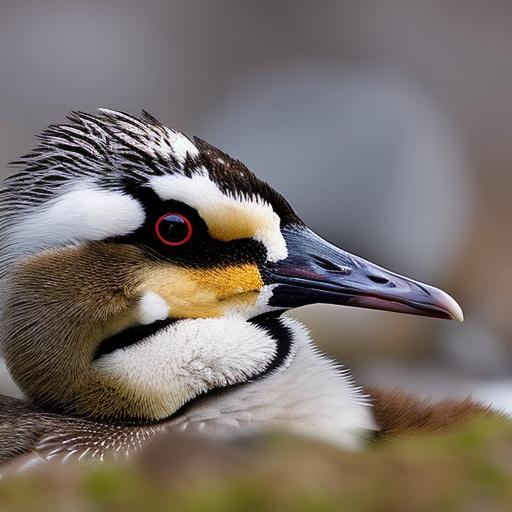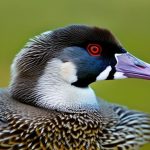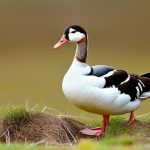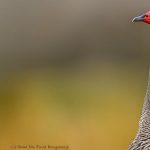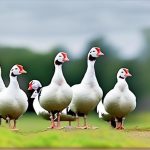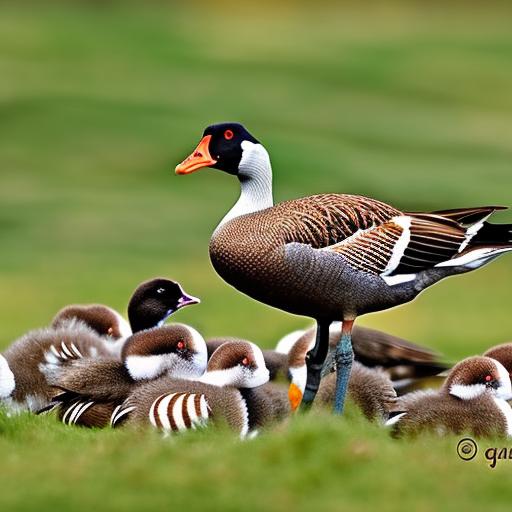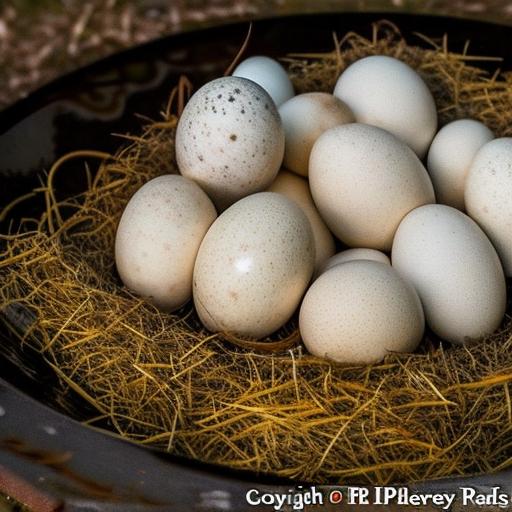The geese breeding season is a crucial time for geese farmers as it determines the success of their operations. During this season, geese engage in mating behaviors, build nests, and lay eggs. Successful breeding is essential for geese farmers as it ensures a steady supply of goslings for meat production, egg production, or as breeding stock for future generations.
Key Takeaways
- Geese breeding season typically occurs in the spring and early summer.
- Understanding geese breeding behavior and environmental factors is crucial for successful breeding.
- Proper preparation, including selecting the right breeding stock and managing facilities, is key to success.
- Feeding and nutrition play a critical role in the health and productivity of breeding geese.
- Monitoring and evaluating breeding performance can help identify and address challenges for future success.
Understanding the Breeding Behavior of Geese
Geese are monogamous birds, meaning they form long-term pair bonds with their mates. Mating typically occurs in the spring when the days are longer and the weather is warmer. Male geese, known as ganders, will often perform elaborate courtship displays to attract a female mate. These displays may include honking, head bobbing, and wing flapping.
Once a pair has formed, they will search for a suitable nesting site. Geese prefer to nest near bodies of water, such as ponds or lakes, as it provides them with easy access to food and protection from predators. The female goose, known as a goose, will construct the nest using grasses and other vegetation. She will line the nest with down feathers to provide insulation for the eggs.
After the nest is complete, the female goose will lay a clutch of eggs. The incubation period for geese eggs is approximately 28-30 days. During this time, both the male and female goose will take turns incubating the eggs. The male goose will often take over incubation duties during the day while the female rests and feeds.
The Role of Environmental Factors in Geese Breeding
Environmental factors play a crucial role in geese breeding success. Temperature and humidity are important considerations for geese farmers. Geese prefer cooler temperatures during the breeding season, ideally between 40-60 degrees Fahrenheit (4-15 degrees Celsius). High temperatures can cause stress and reduce fertility rates. Humidity levels should be kept around 50-60% to prevent the eggs from drying out.
Clean water is essential for geese breeding. Geese require access to clean water for bathing, drinking, and cooling down. Water also plays a role in the mating process, as geese will often perform courtship displays near bodies of water. Geese farmers should ensure that their breeding facilities have a reliable source of clean water.
Weather conditions can also impact geese breeding success. Extreme weather events, such as heavy rain or strong winds, can disrupt nesting and cause damage to eggs. Geese farmers should monitor weather forecasts and take necessary precautions to protect their breeding stock and nests during inclement weather.
Preparing for the Geese Breeding Season
Before the geese breeding season begins, geese farmers should clean and prepare their breeding facilities. This includes removing any debris or waste from the area and disinfecting surfaces to prevent the spread of disease. Breeding facilities should be well-maintained and free from any potential hazards that could harm the geese or their eggs.
Ensuring adequate nesting materials is also important for successful breeding. Geese prefer to build their nests using grasses, straw, or other soft materials. Geese farmers should provide ample nesting materials in their breeding facilities to encourage nesting behavior.
Checking equipment and supplies is another crucial step in preparing for the geese breeding season. This includes inspecting incubators, brooders, and any other equipment used for egg incubation and gosling rearing. Geese farmers should also ensure they have an adequate supply of feed, waterers, and other necessary supplies for the breeding season.
Selecting the Right Breeding Stock for Geese
Selecting the right breeding stock is essential for successful geese breeding. Geese farmers should look for certain characteristics in their breeding geese, such as good health, strong body conformation, and desirable traits for meat or egg production. It is also important to consider genetic diversity when selecting breeding stock to prevent inbreeding and maintain the overall health and vigor of the flock.
Evaluating potential breeding pairs is an important step in the selection process. Geese farmers should observe the behavior and compatibility of potential mates to ensure they will form a strong pair bond. It is also important to consider the breeding history of the geese and their offspring when making breeding decisions.
Feeding and Nutrition for Breeding Geese

Proper feeding and nutrition are crucial for breeding geese. During the breeding season, geese have increased nutritional requirements to support egg production and incubation. Geese farmers should provide a balanced diet that includes a mix of grains, greens, and protein sources such as insects or fish.
Supplemental feeding may be necessary during the breeding season, especially if natural food sources are limited. Geese farmers can provide additional feed to ensure their breeding geese are receiving adequate nutrition. It is important to monitor the body condition of the geese and adjust feeding amounts accordingly.
Managing Geese Breeding Facilities
Proper management of geese breeding facilities is essential for successful breeding. Adequate ventilation and lighting are important considerations for geese farmers. Good ventilation helps maintain air quality and prevents the buildup of ammonia from waste products. Sufficient lighting helps stimulate mating behaviors and ensures proper egg development.
Monitoring and maintaining cleanliness is crucial for preventing disease and ensuring optimal conditions for breeding geese. Geese farmers should regularly clean and disinfect their breeding facilities, paying special attention to nesting areas and water sources. Regular monitoring of the geese’s health is also important to identify any potential issues early on.
Addressing any health issues promptly is crucial for maintaining the overall health and well-being of the breeding geese. Geese farmers should have a plan in place for dealing with common health issues such as respiratory infections or parasites. Regular veterinary check-ups and vaccinations can also help prevent the spread of disease and ensure the health of the breeding stock.
Common Challenges in Geese Breeding Season
Geese breeding season can present several challenges for geese farmers. Predators, such as foxes or raccoons, pose a threat to geese and their eggs. Geese farmers should implement measures to protect their breeding stock, such as installing fencing or using guard animals. It is also important to regularly inspect nesting areas for signs of predator activity.
Aggressive geese can also be a challenge during the breeding season. Male geese, in particular, can become territorial and aggressive towards humans or other geese. Geese farmers should be cautious when handling breeding geese and take necessary precautions to prevent injuries.
Addressing any breeding problems or complications is crucial for maintaining breeding success. This may include addressing fertility issues, egg infertility, or egg breakage. Geese farmers should consult with a veterinarian or experienced breeder to identify the cause of the problem and develop a plan to address it.
Monitoring and Evaluating Geese Breeding Performance
Monitoring and evaluating geese breeding performance is important for making informed decisions and improving breeding success. Geese farmers should track egg production and hatching rates to assess the overall performance of their breeding stock. This information can help identify any trends or issues that need to be addressed.
Evaluating breeding pairs for future use is also important for maintaining genetic diversity and improving breeding success. Geese farmers should assess the performance of each pair, including egg production, hatchability, and the quality of offspring. This information can help determine which pairs should be retained for future breeding and which should be replaced.
Making adjustments to improve breeding success is an ongoing process for geese farmers. Based on the monitoring and evaluation of breeding performance, geese farmers can make adjustments to their breeding program. This may include selecting different breeding pairs, adjusting feeding or management practices, or implementing new strategies to address specific challenges.
Maximizing Geese Breeding Success
In conclusion, the geese breeding season is a critical time for geese farmers. Understanding the breeding behavior of geese, considering environmental factors, and preparing breeding facilities are all important steps in maximizing breeding success. Selecting the right breeding stock, providing proper nutrition, and managing breeding facilities are crucial for maintaining the health and productivity of the geese. Addressing common challenges and monitoring breeding performance allows geese farmers to make informed decisions and continually improve their breeding practices. By prioritizing successful breeding, geese farmers can ensure a steady supply of goslings for various purposes and contribute to the overall success of the geese industry.
If you’re interested in learning more about breeding seasons for different types of poultry, you might find this article on geese breeding season fascinating. Geese have their own unique mating habits and behaviors during this time, and understanding them can be crucial for successful breeding. To delve deeper into the topic, check out this informative article on geese breeding season.
FAQs
What is geese breeding season?
Geese breeding season is the time of year when geese mate and lay eggs in order to reproduce.
When does geese breeding season occur?
Geese breeding season typically occurs in the spring, usually between March and May.
How long does geese breeding season last?
Geese breeding season can last anywhere from a few weeks to a few months, depending on the species of geese and the climate in which they live.
What happens during geese breeding season?
During geese breeding season, male geese will compete for the attention of female geese, and once a pair has formed, they will mate and the female will lay eggs.
How many eggs do geese lay during breeding season?
The number of eggs that geese lay during breeding season can vary depending on the species, but typically ranges from 4 to 12 eggs.
How long does it take for geese eggs to hatch?
Geese eggs typically take around 28 to 30 days to hatch, although this can vary depending on the species and the climate.
What happens after geese eggs hatch?
After geese eggs hatch, the parents will care for and protect their young until they are old enough to fend for themselves.
Meet Walter, the feathered-friend fanatic of Florida! Nestled in the sunshine state, Walter struts through life with his feathered companions, clucking his way to happiness. With a coop that’s fancier than a five-star hotel, he’s the Don Juan of the chicken world. When he’s not teaching his hens to do the cha-cha, you’ll find him in a heated debate with his prized rooster, Sir Clucks-a-Lot. Walter’s poultry passion is no yolk; he’s the sunny-side-up guy you never knew you needed in your flock of friends!

